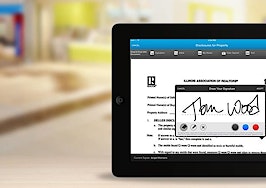- NAR CEO Dale Stinton said DocuSign was in a good position to provide an end-to-end real estate transaction process.
- The tech company which does get the electronic real estate transaction process right will be able to take it to other industries, too.
- The proliferation of more APIs will add great value to the real estate industry.
The industry has been talking about synchronizing electronic transactions in real estate for 20 years now — and the time could now be nigh.
Dale Stinton, CEO of the National Association of Realtors, summed it up yesterday in San Francisco when he said: “After my 35th year at NAR, in all that time, I have not seen a more opportune moment for intelligent minds to get together to figure out the electronic transaction process from beginning to end.
“Whoever does this first will have the keys to the kingdom, and it will be applicable to every industry in the country.”
Speaking at this week’s DocuSign Momentum conference held in San Francisco, which had its first real estate track this year, Stinton, a board member at DocuSign since 2013, said that the winner might not necessarily be the one with the original idea, but will be “the one who executes it best.”
“I know enough to know the time is ripe,” he said. “This is an unlimited opportunity for real estate and any industry.”
65 steps, each needing authorization
There are 65 critical steps in the real estate process, each of them needing electronic authorization, Stinton said. “It’s an area begging for innovation.”
DocuSign, he said, was in ” a sweet spot” for ushering in a seamless real estate transaction process.
In the panel of real estate leaders looking into the future, DocuSign founder Tom Gonser said he was trying to get e-mortgages off the ground 15 years ago. He added: “The next three years will see big companies take the real estate process all the way through in a seamless way.
“In a transaction, what we see is being able to package that one secure stream.”
Tim Drouillard, senior vice president of IT at Re/Max said: “I think we are at a tipping point, and the API (application programming interface) world is about to take off in real estate.”
“It will drive innovation — with new players coming in and barriers to entry coming down. There will be new entrants to the market.”
DocuSign’s general manager of global real estate solutions, Georg Gerstenfeld, said Drouillard’s comment about the important role of APIs was key.
“It’s about connecting the apps most used by agents and brokers rather than creating something new.
“And it’s empowering for the agent. They can choose which app they like to use and we can work together. It’s nice to have that freedom.”
“Agents and brokers spend too much of their time managing the 65 steps of a real estate transaction,” added Gerstenfeld, speaking afterward. “We agree a robust API is critical to realizing that vision, in order to minimize data-entry and simplify the user- experience for agents.”
“We’re taking the same approach on our Transaction Room’s API that we’ve delivered with our eSignature platform, where we now have over 100 developer partners,” he added. “Rather than have a specific deadline, our approach is that this is a continual investment area for our platform.”
Some of the areas DocuSign envisions connecting next are CRM and lead generation tools for the data that feeds a transaction, and mortgage/title for data to close a transaction, said Gerstenfeld.
“The goal is to minimize data entry and enable a truly digital transaction,” he said









